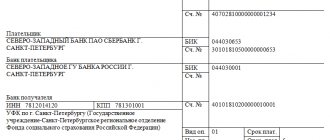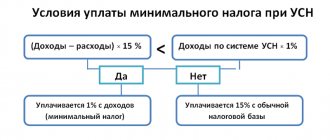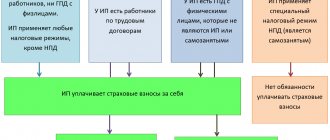Good day, dear visitor!
The goal of long-term investing is to make a profit every year. It's nice to know that your investment has generated income. So, money in hand, plans in mind on where to spend it, high spirits... This is for the recipients. And in accounting - attacks of migraines and nervous tremors.
How to avoid falling into tax traps, whether dividends are subject to insurance premiums in 2021 and what other deductions and taxes need to be paid, I will tell you in detail.
Procedure for paying dividends
The procedure for paying dividends step by step is as follows:
| Step | Action | A comment |
| 1 | Calculate net profit | The basis for the payment of dividends is the profit determined after the closing of the reporting period and payment of all taxes |
| 2 | Making a payment decision | The decision is made by the general meeting of founders based on the results of the reporting period. The decision must be documented by drawing up special minutes of the meeting and an order for the payment of dividends |
| 3 | Distribute dividends | After completing the previous steps, you need to determine how much to pay each participant. Usually distributed proportionally depending on the share of each individual. Although the payment may be larger, this is fraught with certain consequences and may affect the payment of taxes |
| 4 | Pay taxes | Once all the formalities have been completed, the order has been issued, the amounts have been determined, the next step is to pay taxes. In fact, dividends are income, and therefore taxes are paid on them accordingly:
|
How to proceed?
First, you need to note the closing date of the register. This is the main reference point. And by the specified date you will have to already own the shares. If you are counting on payments. By the way, there are a few simple rules here:
- You don't have to hold the promotion for the entire 12 months.
- You just need to make it to the dividend cut-off date.
Even if you sell the security the very next day, after the cut-off date (the end of the register closing date), you will still receive dividends.
If the company's shares are traded on the stock exchange, then the time corridor for your actions narrows. For the reason that there are rules for closing the register for such companies. It closes later than 20 days after the meeting of shareholders takes place.
Taxes payable on dividends
The following taxes must be paid on dividends:
| Resident/Non-Resident | Persons | Tax | Bid |
| Residents | Individuals | Personal income tax | 13% |
| Legal entities | Income tax | 13% | |
| Legal entities with a share of more than 50% | Income tax | 0% | |
| Non-residents | Individuals | Personal income tax | 15% |
| Legal entities | Income tax | 15% |
conclusions
So, are dividends subject to insurance premiums in 2019?
- Cash income received by investors, depositors, and shareholders as profit is not subject to contributions to the Unified Social Tax, because it is accrued not for work, but for investments.
- The amount of payments depends on the amount of funds invested in the company by each participant. The contribution may be expressed in value, number of shares, denomination of bonds or other securities held by these persons.
The rule is valid for deductions to the Pension Fund and other public funds.
Dividends are not subject to insurance premiums in 2021 on the basis of: clause 1 of Art. 236, paragraph 4 of Article 420 of the Tax Code of the Russian Federation, as well as Letter of the Federal Tax Service No. 015-03-11/08-13985. The only tax paid is personal income tax for individuals and income tax for legal entities.
More on the topic Payments under compulsory motor liability insurance in case of an accident in 2021: insurance amounts, documents, deadlines
Restrictions on payment of dividends to founders
We must never forget that every operation within the framework of the activities of any organization is subject to clear regulation by the relevant authorities. Therefore, before making a decision on the distribution of profits, it is necessary to make sure whether the organization has the right to take this action. There are a number of restrictions under which dividends cannot be paid:
- the authorized capital has not been fully paid up; depending on the situation, the share may be redistributed among the remaining founders or, in the worst case, the organization may be liquidated due to a claim from the tax authorities;
- the organization did not repay the debt to one of the share investors who expressed a desire to leave the share ownership;
- the organization, for some reason, is on the verge of bankruptcy or there are obvious reasons that could lead to it;
- the amount of net assets after the closing of the reporting period according to accounting data turned out to be less than the amount of the authorized capital, this condition is mandatory for all organizations and is enshrined in a regulation approved by the Ministry of Finance;
- at the end of the reporting period there is an uncovered loss.
Other types of income that are subject to taxation
The taxation system must provide information about the different types of income of the company. However, not all such contributions will be subject to a fee or tax. Thus, such amounts of money are not subject to taxation if they themselves are not the object of investment. These are the incomes:
- all types of loan payments;
- payment for the purchase and sale of an object or funds for the rental of property;
- funds, if they were donated (here we are not talking about bonuses, but specifically about the income that was gifted to the employee from the employer for good and high-quality work).
So, in addition to dividends to the company’s shareholders, other types of income are not yet subject to insurance premiums, namely:
- maternity benefits, as well as child care payments;
- funds that the employee received as daily travel income;
- financial assistance to one of the company's employees. But at the same time, the amount of funds paid should not exceed 4,000 rubles. They can be paid in circumstances such as the death of one of the employee's relatives or sudden illness.
Accounting for reflecting dividends
When taxed, the following transactions are charged:
| Debit | Credit | Description |
| 84 | 70 (75) | Calculation of dividends to the founders of the organization |
| 70 (75) | 68 | Taxes are calculated depending on whether an individual works in a given organization or not. For a working employee it is personal income tax, for a non-working employee it is income tax. |
| 70 (75) | 50 (51) | Dividends paid |
| 70 (75) | 90 | Revenue from payment of dividends on products |
| 90 | 41 (43) | Reflection of the cost of products transferred as dividends |
| 90 | 68 | VAT accrual on property transferred as income from equity participation |
An example of calculating tax withholding on income from equity participation
Initial data: Balanov O.P. owns a 10% share of Severny Wind LLC, O.P. Balanov. is an employee of this organization. owns a 20% share of Severny Wind LLC. The net profit for 2021 amounted to 4 million rubles. At the board of founders, it was decided to direct all net profit to pay dividends.
Calculation:
- Amount of payments for O.P. Balanova = 4,000,000.00 * 10% * (100% – 13%) = 348,000.00 rubles
- Amount of payments for CJSC "Cotton swab" = 4,000,000.00 * 20% * (100% - 13%) = 696,000.00 rubles
- Explanations: The income tax rate for income from equity participation in other enterprises is 13%.
How are payments calculated?
It all starts with observation. The fact is that the payments themselves will not be accrued without the board of directors. It is this governing body that will:
- Rely on your own payment policy.
- Determine the dividend accrual period.
But these are only recommendations regarding the amount of charges. Plus, there is also a cut-off mechanism. The dividend cut-off is the boundary of the time period by which you should have had shares of the company in your hands. So that you can count on payments. Just at the cut-off time, the register closes.
This information is usually published in the public domain.
Payment of insurance premiums from dividends
A common question that has been actively discussed lately is whether it is necessary to pay insurance premiums on dividends. As already mentioned, dividends are income from equity participation, on which, under Russian law, recipients must pay appropriate taxes. It should be understood that dividends are not remuneration for the founders for performing any duties as management companies; they are their income from investments in cash or property.
In accordance with existing legislation, the basis for calculating contributions to extra-budgetary funds are:
- Income received under an employment contract concluded for the performance of agreed work and provision of services to the organization by the employee;
- Payments and rewards within the framework of fulfilling contract orders, licensing agreements, etc.
To summarize, we can conclude that only payments for specific work and services are subject to insurance premiums.
That is, if the founder does not have an employment contract with the organization, then the payments due to him cannot be the basis for charging contributions to extra-budgetary funds. Consequently, income from equity participation is not subject to the calculation of insurance premiums transferred to extra-budgetary funds.
Dividends in RSV
Calculation of insurance contributions - a consolidated, individual report on mandatory monetary contributions of the company, employee to the Social Insurance Fund, Pension Fund, Compulsory Medical Insurance.
Are dividends reflected in the calculation of insurance premiums in 2019? The articles of the Tax Code and the letter from the Social Insurance Fund show that the DAM must include information about deductions from those types of earnings that are subject to insurance contributions. Dividends are not reflected in the DAM, because their payments are not regulated by labor relations. Information about the amounts paid to shareholders is not reflected in the calculation of insurance premiums.
Directions for using profit by an individual entrepreneur
The income of an individual entrepreneur is his net profit, which remains after deducting all expenses, paying all prescribed taxes and other obligatory payments. According to existing legislation, an entrepreneur has every right to freely dispose of his income, since he is the sole owner of all money earned from business activities. Also, there is no regulation of the areas of use of profit; accordingly, payment of income from equity participation to oneself in this situation cannot be.
Let's remind you of the duties of a tax agent when transferring dividends.
The organization paying dividends becomes a tax agent, that is, it is obliged to withhold tax on dividends and transfer it to the budget. If it is impossible to withhold tax (if paid in kind), the agent is obliged to inform the tax office about the source of income of its recipient. The tax payment date is no later than the date of transfer of dividends. Responsibility for failure to fulfill this obligation is described in Article 123 of the Tax Code of the Russian Federation - a fine of 20% of the amount to be withheld. There are also penalties accrued for each day of delay in payment.
It is worth recalling that after changes were made in 2015 to Article 76 of the Tax Code of the Russian Federation (which regulates the procedure for blocking bank accounts at the initiative of the tax inspectorate), failure to submit calculations for payment of tax on dividends became an indisputable basis for blocking the account of a tax agent. Actually, a similar focus existed before, but arbitration practice, as a rule, protected tax agents: after all, formally they did not submit a declaration, but only a calculation. The right of the tax authorities was thus called into question. But after the changes in the Tax Code, I repeat, this issue no longer causes discrepancies.
Now about the issue of withholding the unpaid tax itself. Regarding fines and penalties, the courts agree with the tax authorities: the agent must pay them because he did not fulfill his duties. And regarding the amount of tax, the court’s position is as follows: the agent is not a taxpayer, and he cannot pay the tax at his own expense. Therefore, tax officials were asked to go to the taxpayer himself (that is, the recipient of the dividend) and withhold the tax there.
But in any case, penalties will be accrued to the agent until the recipient of the dividend repays the debt to the budget. This is the nuance.
By the way, the absence of the obligation to pay the tax itself does not apply to the situation when income is paid to a foreign legal entity. In the case where the taxpayer is not under the control of our tax authorities, then the responsibility for transferring the tax to the budget of the Russian Federation lies with the agent. This circumstance is stipulated in the resolution of the Plenum of the Supreme Arbitration Court dated July 30, 2013 No. 57. By the way, it contains conclusions about the impossibility of blocking the agent’s account, but, I repeat, they were made even before the changes to Article 76 of the Tax Code of the Russian Federation.
Typical errors in dividend calculation
Mistake #1. Exemption from taxes for organizations applying special regimes
The application of any special taxation regime does not constitute a basis for exemption from payment of the corresponding taxes established on income from equity participation. Although the special regime itself acts as an alternative to paying three taxes, including income tax, this applies only to the main activity. An exception may be the situation when dividends are paid in kind and are essentially sales.
Mistake #2. Refund of personal income tax paid to the budget
On dividends that are required to be paid to a non-resident, the organization must calculate personal income tax at a rate of 15%. In a situation where a non-resident has changed his status of residence in our country and has completed all the documents for obtaining residency, he has the right to apply for a tax recalculation for the current year in which he received a new status at a rate of 13%. However, the tax office will recalculate and return it.
Mistake #3. Payment of income from equity participation in kind by an organization using a special tax regime (UTII)
In the case where an organization applies UTII, the transaction for the transfer of property as income from shared ownership must be taxed within the limits established for the special regime.
Features of calculation and payment
Profit is distributed not only from the current year, but also across previous reporting periods. For example, if previously income was not distributed in different directions. The general meeting of shareholders or members must make a final decision as to whether the matter is worth pursuing at this time.
The decision must be formalized using a protocol form. Otherwise, the accounting department will not be able to draw up documents and record the business transaction at all.
Dividends are also not included in the 4-FSS report.
You need to know exactly how much profit you're making in order to make decisions about how it's distributed. It is much easier to look at the financial statements; in other cases, it is difficult to find answers.
Section 3 of the accounting report should describe such phenomena in detail. The presence of a bracket indicates an undistributed loss. All amounts must be indicated for a specific date. If the amount was not distributed in previous periods, then information about it is also displayed in full.
Important! Determining net profit for a specific period is the most important issue. The income statement should contain a detailed description of the required figures.





